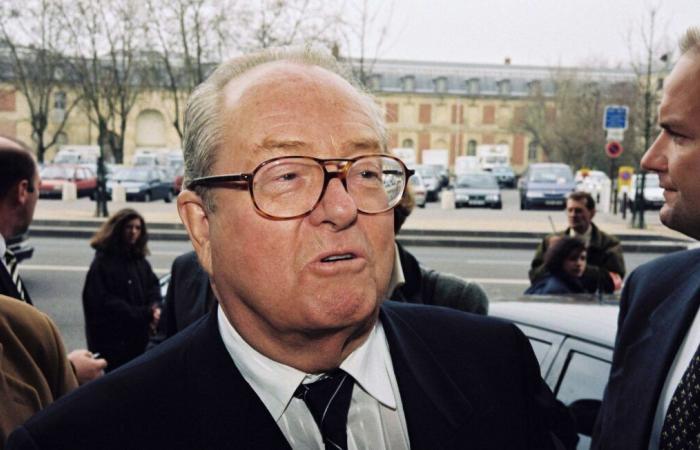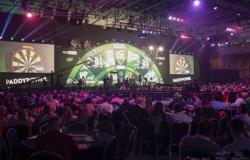One of the longest legal dramas for a literary work in recent years! In August 1998, Mathieu Lindon, journalist at Liberation and author with POL editions, publishes his tenth novel entitled The Trial of Jean-Marie Le Penwhich tells the fictional trial of a National Front activist, and features its founder, who died this Tuesday at the age of 96. The head of the FN rushed to have a novel banned for defamation at the end of the same decade. Chronicle of an imaginary trial and a real legal battle.
The fictional Jean-Marie Le Pen from Mathieu Lindon’s novel
The title of the novel is misleading. This novel does not tell the trial of Jean-Marie Le Pen, but narrates the fictional trial of a young man, Ronald Blistier. One evening, while putting up FN posters, this young activist coldly shot dead a man, Hadi Benfartouk, because of his North African origins.
The narrator of the novel is none other than the defense lawyer of the FN activist, Maître Mine, Jewish, homosexual and left-wing. His strategy is to make the young man’s trial that of the president of the FN. During his pleading, he argues that his client acted under the influence of the politician, who incites his supporters to commit violent, hateful and racist acts. The novel thus explores in a fictional manner the possible consequences of the National Front’s discourse on its sympathizers. By mixing fiction and reality, it offers a reflection on French society and the issues of racism.
The novel follows the various stages and deliberations of the trial of Ronald Blistier, as well as the reports or statements in the press. The fictional Jean-Marie Le Pen appears very little in the novel, always briefly: during press conferences on the trial or during public speeches following the demonstrations surrounding the trial.
Mathieu Lindon’s novel is “therefore a hybrid product that we could call, in the language of lawyers, a fiction of reality, which is located in the middle between fiction and non-fiction”, analyzes Anna Arzoumanov, teacher of conferences in French linguistics and literature at the University of Paris Sorbonne, in his article “Free indirect discourse in court. Overview of contemporary jurisprudence in press law”.
The defamation trial of the real Jean-Marie Le Pen
“The text turns out to be more of a space for reflection than an incriminating text – much more focused on homosexuality, racism and crowd psychology than on Le Pen in particular,” explains Anne-Marie Duquette in her memoir entitled “The trial of Jean-Marie Le Pen: a committed and transgressive work on trial”.
However, just a few months after the novel’s publication, the real Jean-Marie Le Pen and the National Front filed a lawsuit for defamation against Mathieu Lindon and his publisher, Paul Otchakovsky-Laurens. Jean-Marie Le Pen considers that six passages of the novel are harmful, in particular when he is qualified as “leader of a gang of killers”.
The first hearing took place on December 18, 1998 before the 17th criminal chamber of the Paris High Court. The sentence fell on October 11, 1999: four passages were deemed defamatory. The writer and his publisher are ordered to pay damages and a fine to the State. Mathieu Lindon’s book is withdrawn from sale.
Support from the literary community of the time
This trial caused a reaction in the literary community of the time. Many feathers rise to support the two men of letters: Marie Darrieussecq in LiberationJosyane Savigneau and Philippe Sollers in The WorldJacques Henric in Humanity. “Passages from the book The Trial of Jany Le Penfor which Mathieu Lindon and his publisher were condemned, are not defamatory. We are ready to write them into a novel. We will write against Le Pen”, signed 97 intellectuals and writers including Annie Emaux, Amélie Nothomb, François Bon and Éric Chevillard on November 16, 1999 in a petition published in Liberation.
Following the publication of this petition, the director of the daily, Serge July, was in turn prosecuted for defamation. The Paris criminal court found him guilty in 2000 and sentenced him to a fine and damages. The press man becomes the third applicant for the following trials.
A textbook case of literary trials
The applicants invoke Article 10 of the European Convention on Human Rights on freedom of expression, supporting the idea that “it is up to works of fiction to reflect controversies on the moral responsibility of the National Front and the ideas of its leader in the commission of racist crimes.” Whether on appeal or on cassation, the court agrees with the first verdict established by the high court.
The case will go before the European Court of Human Rights (ECHR) in 2007. This last instance dismisses the three applicants. “Although the plot is imaginary, the president of the National Front, a real person, is the “pivot” around which the imaginary characters evolve and are defined – and the ideas, speeches and actions of Mr. Le Pen are described as closely as possible to reality,” argues the ECHR. “If we push the logic of this judgment to its conclusion, it means that the writer does not have to deal with reality. If the writer cannot deal with reality, he cannot write,” laments the writer interviewed by France Info following the death of the founder of the FN.
“The Trial of Jean-Marie Le Pen by Lindon has become the emblem of fiction prosecuted for defamation. If the novel itself did not have a huge response upon its release, the trial of the Trial was, for its part, resounding,” concludes Anne-Marie Duquette. This case is widely cited and analyzed in legal or literary works and articles addressing the issue of literary trials. A case study for researchers interested in the limits of fiction and freedom of creation and expression. Who would have thought that Jean-Marie Le Pen had so much in common with Madame Bovary?






